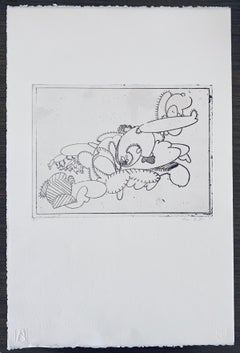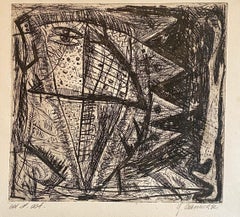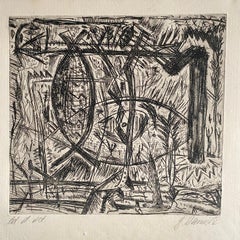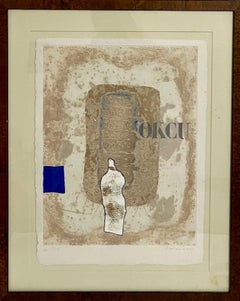Want more images or videos?
Request additional images or videos from the seller
1 of 10
Gunter DamischAustrian Junge Wilde Abstract Etching Hand Signed, New Expressionistc.1980s
c.1980s
$850List Price
About the Item
- Creator:Gunter Damisch (1958, Austrian)
- Creation Year:c.1980s
- Dimensions:Height: 16 in (40.64 cm)Width: 17.5 in (44.45 cm)
- Medium:
- Movement & Style:
- Period:
- Condition:minor wear in margins. please see photos.
- Gallery Location:Surfside, FL
- Reference Number:1stDibs: LU3827565172
About the Seller
4.9
Platinum Seller
Premium sellers with a 4.7+ rating and 24-hour response times
Established in 1995
1stDibs seller since 2014
1,810 sales on 1stDibs
Typical response time: 1 hour
Authenticity Guarantee
In the unlikely event there’s an issue with an item’s authenticity, contact us within 1 year for a full refund. DetailsMoney-Back Guarantee
If your item is not as described, is damaged in transit, or does not arrive, contact us within 7 days for a full refund. Details24-Hour Cancellation
You have a 24-hour grace period in which to reconsider your purchase, with no questions asked.Vetted Professional Sellers
Our world-class sellers must adhere to strict standards for service and quality, maintaining the integrity of our listings.Price-Match Guarantee
If you find that a seller listed the same item for a lower price elsewhere, we’ll match it.Trusted Global Delivery
Our best-in-class carrier network provides specialized shipping options worldwide, including custom delivery.You May Also Like
A fading flame - XXI Century, Figurative, Abstract Etching Print with Watercolor
By Leszek Rózga
Located in Warsaw, PL
LESZEK RÓZGA (1924-2015).
He studied painting at Maria Skarbek-Kruszewska private atelier in 1945-46. In 1948, he began studies at the art school in Łódź (later: Academy of Fine Art...
Category
Early 2000s Contemporary Abstract Prints
Materials
Paper, Watercolor, Etching
Two apples - XX Century Figurative Etching Print, Nude, Landscape
By Leszek Rózga
Located in Warsaw, PL
Etching on paper, épreuve d'artiste, 1973
LESZEK RÓZGA (1924-2015).
He studied painting at Maria Skarbek-Kruszewska private atelier in 1945-46. In 1948, he began studies at the art...
Category
Early 2000s Contemporary Abstract Prints
Materials
Paper, Etching
$898
H 11.82 in W 9.06 in
Little town - XX Century Figurative Etching Print with Watercolor, Colorful
By Leszek Rózga
Located in Warsaw, PL
LESZEK RÓZGA (1924-2015).
He studied painting at Maria Skarbek-Kruszewska private atelier in 1945-46. In 1948, he began studies at the art school in Łódź (later: Academy of Fine Art...
Category
Early 2000s Contemporary Abstract Prints
Materials
Paper, Watercolor, Etching
The trial - a judge. Figurative etching, Colorful, Satire, Polish art
By Leszek Rózga
Located in Warsaw, PL
21th century figurative etching print by Polish artist Leszek Rozga. Artwork depicts italian landscape in classic stylea creature in a satirical erotic way. This piece is signed by t...
Category
2010s Contemporary Figurative Prints
Materials
Paper, Etching
$539
H 7.29 in W 5.32 in
Girls. Figurative limited edition etching, Surrealist, Nude, Polish art
By Leszek Rózga
Located in Warsaw, PL
Figurative surreal etching print with watercolor by Polish artist Leszek Rozga. Artwork depicts several portraits in different styles. Artwork is signed by the artist, it comes from ...
Category
2010s Contemporary Figurative Prints
Materials
Paper, Watercolor, Etching
$1,078
H 6.89 in W 6.11 in
Merry-go-round. Surrealistic etching, Monochromatic, Minimalistic, Polish art
By Leszek Rózga
Located in Warsaw, PL
20th century figurative drypoint print by Polish artist Leszek Rozga. This piece is signed by the artist.
LESZEK RÓZGA (1924-2015)
He studied painting at Maria Skarbek-Kruszewska pr...
Category
2010s Contemporary Figurative Prints
Materials
Paper, Etching
A reading one. Figurative etching, Monochromatic, Minimalistic, Polish art
By Leszek Rózga
Located in Warsaw, PL
20th century figurative etching print by Polish artist Leszek Rozga. This piece is signed by the artist.
LESZEK RÓZGA (1924-2015)
He studied painting at Maria Skarbek-Kruszewska pri...
Category
2010s Contemporary Figurative Prints
Materials
Paper, Etching
$419
H 5.91 in W 3.94 in
Dancing with masks. Figurative etching, Monochromatic, Minimalistic, Polish art
By Leszek Rózga
Located in Warsaw, PL
20th century figurative etching print by Polish artist Leszek Rozga. This piece is signed by the artist.
LESZEK RÓZGA (1924-2015)
He studied painting at Maria Skarbek-Kruszewska pri...
Category
2010s Contemporary Figurative Prints
Materials
Paper, Etching
Trained butterfly. Figurative etching, Monochromatic, Surrealism, Polish artist
By Leszek Rózga
Located in Warsaw, PL
20th century figurative etching print by Polish artist Leszek Rozga. This piece is signed by the artist.
LESZEK RÓZGA (1924-2015)
He studied painting at Maria Skarbek-Kruszewska pri...
Category
2010s Contemporary Figurative Prints
Materials
Paper, Etching
Adoration. Surrealistic etching, Monochromatic, Minimalistic, Polish art
By Leszek Rózga
Located in Warsaw, PL
20th century figurative drypoint print by Polish artist Leszek Rozga. This piece is signed by the artist.
LESZEK RÓZGA (1924-2015)
He studied painting at Maria Skarbek-Kruszewska pr...
Category
2010s Contemporary Figurative Prints
Materials
Paper, Etching
$419
H 4.14 in W 4.14 in
More From This Seller
View AllAmerican Artist Contemporary Etching Tom Butter Cartoon Cactus Desert Landscape
Located in Surfside, FL
Born in Amityville, NY, in 1952, Tom Butter received his B.F.A. from Philadelphia College of Art in 1975 and his M.F.A. from Washington University, St. Louis, two years later. Since ...
Category
Late 20th Century Contemporary Landscape Prints
Materials
Etching
Austrian Junge Wilde Abstract Etching Hand Signed, Neo Expressionist Art Print
By Gunter Damisch
Located in Surfside, FL
Gunter Damisch (1958, Steyr- 2016 in Vienna) was an Austrian painter and sculptor . He is one of "den Neuen Wilde" New Savages. (Junge Wilde)
Gunter Damisch attended the Musikgymnasium Linz and then studied medicine and German and history for a few semesters. By age 16, he had already made 150 woodcuts and attended the International Summer Academy of Fine Arts in Salzburg with Claus Pack, he studied from 1978 to 1983 at the Academy of Fine Arts Vienna with Maximilian Melcher and Arnulf Rainer . In 1992 he took on a visiting professorship at the Vienna Academy (master class for graphics ) in Vienna, and since 1998 he has been a full professor there. From 1997 until his untimely death in 2016, he was head of the graphic arts department at the Vienna Academy of Fine Arts. the 1980s Damisch was a member of the Viennese punk band Molto Brutto, where he played bass and organ. Gunter Damisch lived and worked in Vienna and Freidegg . He was one of the most important international representatives of contemporary Austrian art because of his unmistakable, convincing and consistently formulated repertoire of colors and shapes (reminiscent of Friedensreich Hundertwasser.) He worked in stone lithos, woodcuts, lithograph, artists’ books like a free jazz virtuoso, making huge, one-of-a-kind pieces with collage, drawing, painting, woodcut and monotype on the same sheet. In 1978, the Junge Wilde painting style arose in the German-speaking world in opposition to established avant garde, minimal art and conceptual art. It was linked to the similar Transavanguardia movement in Italy, USA (neo-expressionism) and France (Figuration Libre). The Junge Wilde painted their expressive paintings in bright, intense colors and with quick, broad brushstrokes very much influenced by Professor at the Academy of Art in Berlin, Karl Horst Hödicke They were also known as the Neue Wilde. Artists included; Austria: Siegfried Anzinger, Erwin Bohatsch, Herbert Brandl, Gunter Damisch, Hubert Scheibl...
Category
20th Century Contemporary Abstract Prints
Materials
Etching
Austrian Junge Wilde Abstract Etching Hand Signed, New Expressionist
By Gunter Damisch
Located in Surfside, FL
Gunter Damisch (1958, Steyr- 2016 in Vienna) was an Austrian painter and sculptor . He is one of "den Neuen Wilde" New Savages. (Junge Wilde)
Gunter Damisch attended the Musikgymnasium Linz and then studied medicine and German and history for a few semesters. By age 16, he had already made 150 woodcuts and attended the International Summer Academy of Fine Arts in Salzburg with Claus Pack, he studied from 1978 to 1983 at the Academy of Fine Arts Vienna with Maximilian Melcher and Arnulf Rainer . In 1992 he took on a visiting professorship at the Vienna Academy (master class for graphics ) in Vienna, and since 1998 he has been a full professor there. From 1997 until his untimely death in 2016, he was head of the graphic arts department at the Vienna Academy of Fine Arts. the 1980s Damisch was a member of the Viennese punk band Molto Brutto, where he played bass and organ. Gunter Damisch lived and worked in Vienna and Freidegg . He was one of the most important international representatives of contemporary Austrian art because of his unmistakable, convincing and consistently formulated repertoire of colors and shapes (reminiscent of Friedensreich Hundertwasser.) He worked in stone lithos, woodcuts, lithograph, artists’ books like a free jazz virtuoso, making huge, one-of-a-kind pieces with collage, drawing, painting, woodcut and monotype on the same sheet. In 1978, the Junge Wilde painting style arose in the German-speaking world in opposition to established avant garde, minimal art and conceptual art. It was linked to the similar Transavanguardia movement in Italy, USA (neo-expressionism) and France (Figuration Libre). The Junge Wilde painted their expressive paintings in bright, intense colors and with quick, broad brushstrokes very much influenced by Professor at the Academy of Art in Berlin, Karl Horst Hödicke They were also known as the Neue Wilde. Artists included; Austria: Siegfried Anzinger, Erwin Bohatsch, Herbert Brandl, Gunter Damisch, Hubert Scheibl...
Category
20th Century Contemporary Abstract Prints
Materials
Etching
French Pop Art Modernist Textured Carborundum Etching Abstract James Coignard
By James Coignard
Located in Surfside, FL
Carborundum Etching by James Coignard (French, 1925-2008)
Signed and numbered 5/15. This might be a proof edition
Includes insert by Michel Bohbot
Frame: 22.5" X 18"
Image: 16.75" X ...
Category
20th Century Abstract Expressionist Abstract Prints
Materials
Mixed Media, Etching
Spanish Post Modern Abstract Aquatint Color Etching Antoni Tapies
By Antoni Tàpies
Located in Surfside, FL
Antoni Tapies (Spanish, 1923-2012)
Color Etching, aquatint and polychrome carborundum print
Estisores-2,
c. 1979
Hand signed and numbered 31/75 in pencil in the lower margin, publi...
Category
1970s Abstract Expressionist Abstract Prints
Materials
Etching, Aquatint
Large Conceptual "Last Book of Life" Photo Etching 1970s Pop Art Photograph
By Les Levine
Located in Surfside, FL
Last Book of Life. (Photos from a dinner of Richard Nixon’s with Chou En Lai’s various views of Chinese chopsticks)
Photograph etchings
Printed on Stonehedge black paper
Hand signe...
Category
1970s Conceptual Abstract Prints
Materials
Etching, Photogravure



